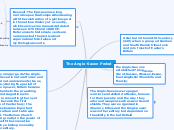The Anglo-Saxon Period
it started in the mid-5th century (449) when a group od German and South Danish tribes took control of much of Eastern Britain
before them the Romans invaded England who had replaced the Celts, Scots and Picts.
the Anglo-Saxons established 7 kingdoms (Kent, Sussex, Wessex, Essex, East Anglia, Northumbria and Mercia)
The Anglo-Saxons were pagan warriors and skilled craftsmen, famous for their jewelry and the way they adorned weapons such as swords and shields. They were organized in itinerary tribes and the King's power was not hereditary but depended on the ability in the battlefield
Beowulf. The Epic poem is a long narrative poetical composition dealing with the celebration of a glorious past in the national history of a country, which survives in a manuscript dated between 675 CE and 1000 CE. References to historical events are numerous but the plot is about supernatural folk-tales and mythological events.
the society described is aristocratic and military
the narrative is made up of "type-scenes" (the banquet, the battle, the voyage and the funeral)
It's an objective narration - the poet's point of view coincides with the ones of the literary characters
the style is elevated and the vocabulary rich and various
the aim is didactic - the poem contributes to create the heroic ethic of a nation
main theme is the nature of heroic life and leadership
it celebrates a code of loyalty and bravery
Anglo-Saxon major gods. The Anglo-Saxons believed in natural forces and worshipped natural elements (trees, sun, woods..). During the period of Anglo-Saxon power, Britain became Christian thanks to the preaching work of Saint Augustine who succeeded in converting the royal family and became the first Archbishop of Canterbury; the monasteries became important centers of culture and Latin was introduced. The Roman Church contributed greatly to the power of kings and with the coronation ceremony by a bishop monarchy became hereditary.
The term Anglo-Saxon refers to the literature of the period known as Old English literature
written in Old English (the West Saxon dialect, grammar similar to German)
first literary production was oral and meant to be sung
main subjects: religion, war, heroic deeds, trials of daily life
Beowulf is the only long epic poem
verse form, use of alliterations, kennings, sung by stops
